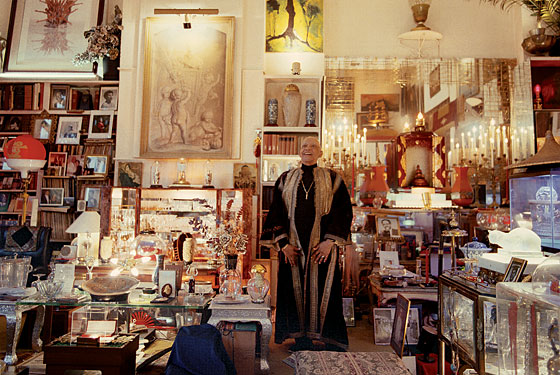Overcoming: Don Shirley

Don Shirley in his Carnegie Hall apartment, just one area of it.
In 1984, while working at the Joseph Patelson Music House, I made friends with pianist Don Shirley. He had come into the store wearing a flamboyant white Navy captain's hat similar to the one Count Basie wore. He proceeded to thumb through the record bins whereupon we struck up a conversation, Don taking special interest in learning that I was a composer, and giving me his phone number so that we might continue our discussion in more depth. Visiting with Don in his transplendent Carnegie Hall apartment – our conversations mostly about music typically went on for six hours or so – decorated with his own sublime paintings and stunningly exotic artifacts from all over the globe, not to mention two premiere grand pianos, I was crestfallen to learn how he was originally denied the opportunity to perform classical music in America because of the color of his skin, thus leading to his amalgam of popular music and jazz blended into classical music influences. Don related this discrimination experience with considerable bitterness. When I first heard Don perform his annual recital adjacent to his apartment in the main Carnegie Hall, it was the most magical piano tone I had ever heard, seemingly rising up out of the floor, which had been transformed into a living resonating chamber, rendering African American spirituals through his uncanny transcriptions. Don shared myriad fascinating stories with me about his life in music, including how he performed New World a-Comin' at Carnegie Hall conducted by his friend and composer of the work, Duke Ellington; about taking piano lessons from Vladimir Horowitz; how he was related to Thurgood Marshall and Cicely Tyson; and details of an estate he had owned in Oyster Bay. Shirley was among the most intellectually brilliant and articulate persons I ever met, and we discussed in great detail a wide range of topics related to the aesthetics of music. (I believe Shirley was fluent in over ten languages.) Regretfully, I cannot recall specifics about our conversations, but there was a healthy degree of debate involved, likely related to some of my unconventional views, the two of us squaring off like in a chess match, Don expressing frustration at times about not being able to dissuade me on some points. On one occasion, Don commented to me that people who were uncommonly attractive in a physical sense frequently faced a daedalean quandary because an unintentional and unconscious sexual allure and/or ocular intimidation often overshadowed that person’s inner self and merit, sometimes leading to various forms of discrimination. To my bewilderment, Shirley then included myself in this category believing that this element would distract people from who I really was, including the true nature of my music. Concurrently, while working together at Patelson's, Stephanie Vlahos also startled me by enthusing that I was substantially more handsome than most classical musicians. Stephanie was (and is) very beautiful so she was likely feeling a commonality. Like many of us entering middle age, I suppose, I used to be better looking than now. (This paragraph is borrowed from Batiked by an Aspara: Catharine Buchanan.)
Michael Robinson (Manhattan 1987) In addition to my visits to his apartment, there were also a number of phone calls also about music aesthetics that went on for hours and hours. Sorry, I really wish I could remember exactly what we spoke about! I do know it was a high-level, virtuosic exchange in the manner of My Dinner with Andre, except that both of us spoke for equal amounts of time. Too bad there isn't a transcript! Content was likely about new ideas in music composition that excited me compared and contrasted with European and Russian masters of the past. I do recall Don expressing great admiration for Sergei Rachmaninoff as a composer, pianist, and person, including feeling the Russian composer's character was most admirable. And Shirley's admiration for Alexander Scriabin's piano compositions had no bounds, performing some of those works for me. Related to jazz, we discussed Miles Davis and Lee Konitz, and how Richard Davis was first paired with Shirley after arriving in Manhattan from Chicago.
Don Shirley (1985) around the time I knew him Most surprising was learning of how Don had participated in the original psychedelics tests conducted by Timothy Leary at Harvard before the professor had become a household name. Shirley's contribution involved playing the same Scriabin piece straight and high, then comparing the two performances. Don told me that while playing under the influence he felt it was the most extraordinary interpretation ever, but the recorded evidence found that effort shoddy and incomprehensible. One disappointment occurred when in the midst of a long conversation one night Don became hungry, and asked if I wished to accompany him to his favorite restaurant in Harlem. I found this an exciting idea and wished to join him, but then Don changed his mind and said the jeans and T-shirt I was wearing were inappropriate for the place he had in mind. We ended up a nearby diner where he admonished me for picking up some french fries with my fingers. - Michael Robinson, September 2017, Los Angeles
© 2017 Michael Robinson All rights reserved
Michael Robinson is a Los Angeles-based composer, programmer, pianist and musicologist. His 199 albums include 152 albums for meruvina and 47 albums of piano improvisations. Robinson has been a lecturer at UCLA, Bard College and California State University Long Beach and Dominguez Hills.
|